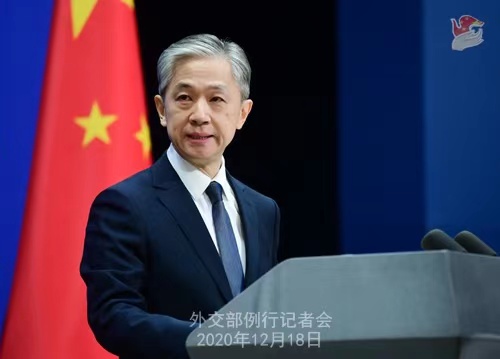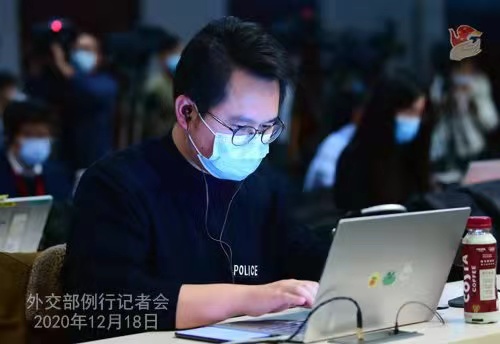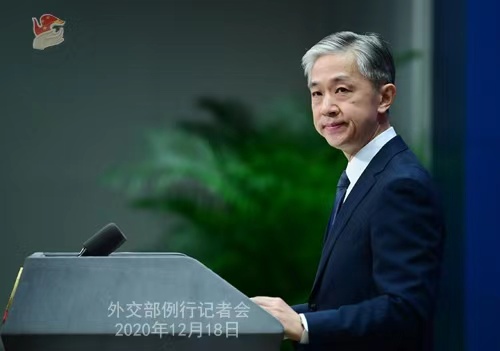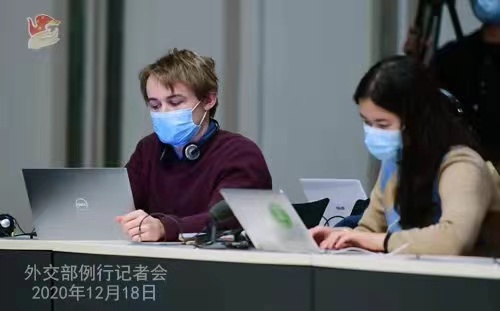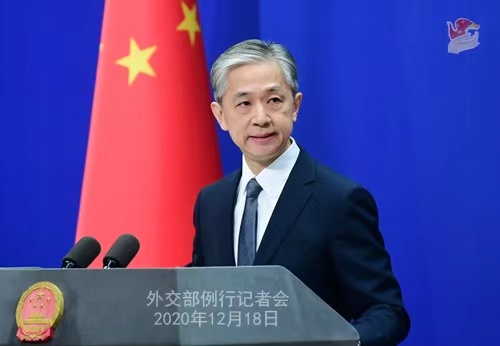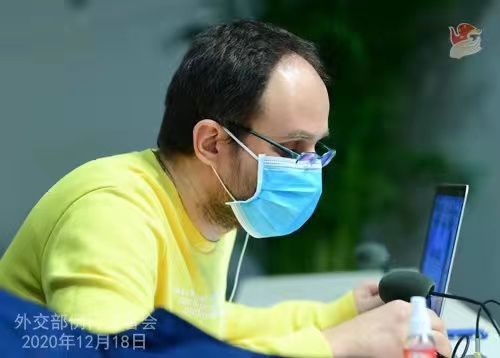| Foreign Ministry Spokesperson Wang Wenbin's Regular Press Conference on December 18, 2020 |
| 2020-12-18 22:52 |
|
CCTV: Recently, the Chinese government and the African Union have signed a cooperation plan to promote the Belt and Road Initiative in Africa. Could you give us more details? Wang Wenbin: Recently, Director of the National Development and Reform Commission He Lifeng and Chairperson of the African Union Commission Moussa Faki Mahamat signed a cooperation plan between the Government of the People's Republic of China and the African Union on jointly promoting the building of the Belt and Road Initiative. This is the first cooperation document signed by China and regional international organizations to jointly build the Belt and Road Initiative. As planned, China and the AU Commission will establish a coordination mechanism for the BRI cooperation and advance the implementation of the cooperation plan. Up to now, China has signed 202 cooperation documents with 138 countries and 31 international organizations on BRI cooperation. Africa is an important part of the BRI cooperation. 44 African countries and the AU have signed relevant cooperation documents with China, accounting for one third of the total. Under the BRI framework, many projects have been completed, including the first phase of the Nairobi-Malaba Railway in Kenya, Mozambique's Maputo Bridge and the Walvis Bay Port new container terminal in Namibia, which has forcefully enhanced African countries' efforts to fight COVID-19 and promote socio-economic development. China has been Africa's biggest trading partner for the 11th consecutive year and one of the main sources of investment for African countries. China stands ready to work with Africa to enhance synergy between the BRI, the AU's Agenda 2063, and the development strategies of African countries, deepen practical cooperation in various fields, achieve common development by leveraging complementary strengths and build a closer China-Africa community with a shared future. Sputnik News Agency: Russian President Putin told the annual press conference on December 17 that Russia and China share common interests in many areas and the leaders of the two countries maintain high-level mutual trust and practical, good relations. How do you respond to that? Wang Wenbin: Thank you for your interest in China-Russia relations. The year 2020 witnessed a pandemic and changes unseen in a century, amid which China and Russia have unswervingly carried out global cooperation against COVID-19, upheld international equity and justice and set an example of harmonious coexistence between major countries. The two heads of state had multiple telephone calls and attended various important multilateral video conferences. Thanks to the close exchanges and strategic guidance of the two leaders, the China-Russia comprehensive strategic partnership of coordination for a new era has continued to improve and demonstrated strong resilience and endogenous dynamic. China has become the biggest export destination for Russia's agricultural products and remains its top trading partner, with booming cooperation on new business forms including cross-border e-commerce. Under the framework of the "Year of Scientific and Technological Innovation", China and Russia rolled out the longest list of cooperation projects. The connotation of the China-Russia comprehensive strategic partnership of coordination for a new era has been enriched and the public support for such relationship in both countries has grown stronger. The two sides have jointly defended the outcome of the victory in WWII and firmly supported each other in rejecting external interference and denigration and have become important forces to uphold global strategic stability. Next year is also of special significance to China and Russia. The two sides will celebrate the 20th anniversary of the signing of the Treaty of Good-Neighborliness and Friendly Cooperation to carry forward the friendship from generation to generation. The two sides will continue to conduct the activities of the "Year of Scientific and Technological Innovation" as planned to ensure the successful completion of the event. With the strategic guidance of the two heads of state and the concerted efforts of the two peoples, we have sufficient confidence and persistence to safeguard the hard-won development outcomes of our bilateral relations, maintain the good momentum in our vigorous cooperation and play a more constructive role in post-COVID global governance.
Reuters: According to a Reuters report, the United States will add around 80 Chinese companies, including chip maker SMIC to a trade blacklist on Friday. Do you have any comment on this report? Wang Wenbin: If this report is true,it will be another proof that the United States has been using its state power to crack down on Chinese companies. China firmly opposes such practices. The U.S. side claims that it champions market economy and fair competition, but its politicization of trade issues goes against its words as well as international trade rules and is detrimental to the interests of both Chinese and American companies, the normal technological exchanges and trade flows between the two countries and even on a global scale, and the stability of global industrial chains, supply chains, and value chains. We urge the U.S. side to stop its wrong behavior of oppression of foreign companies. China will continue to take necessary measures to safeguard the legitimate rights and interests of Chinese companies. The Paper: Babatunde Olowokure, the WHO's regional emergencies director in the Western Pacific, told a news conference on Thursday that WHO continues to contact China and to discuss the international team and the places they visit. He said that, "Our understanding at this time is that China is welcoming the international team and their visit...This is anticipated, as far as we are aware, to happen in early January." Do you have any comment? Wang Wenbin: I took a similar question yesterday. Since the outbreak of COVID-19, China has taken the lead in working together with WHO on origin-tracing in an open, transparent and responsible attitude. WHO experts have visited China twice. Chinese experts and WHO and international expert teams have held many virtual exchange sessions to share progress in origin-tracing and experience in combating the virus. WHO has also updated China on progress in global origin-tracing research. The two sides are steadily advancing cooperation and in close communication on the cooperation and work plan related to origin-tracing going forward. At the same time, I would like to point out that origin-tracing is an evolving process which may involve many countries and places. We've recently read many reports on the virus breaking out in multiple places worldwide last year. It proves again that tracing the origin of the novel coronavirus is a scientific task that must be taken very seriously. It calls for scientists to carry out investigation and research worldwide. China stands ready to continue to strengthen cooperation with the WHO to advance the global origin-tracing. We hope that relevant countries will do the same as China does and actively cooperate with the WHO so that we can better prevent similar public health crises from occurring, and be better prepared to deal with a similar crisis when it does occur.
AFP: The US military said in a statement yesterday that China was the most pressing long-term strategic threat and said the US Navy would be more assertive in the future in response to violations of international law. Does China have any response to this statement? Wang Wenbin: China is committed to peaceful development and a defense policy that is defensive in nature. We are a builder of world peace, a contributor to global development, and an upholder of international order. China's national defense development is entirely aimed to safeguard national sovereignty, security and development interests, as well as regional and international peace. We don't intend to and will not pose any threat to other countries. China's development means a growing force for world peace. China is committed to developing China-U.S. relations featuring non-conflict, non-confrontation, mutual respect and win-win cooperation, while firmly safeguarding its sovereignty, security and development interests. We hope that the U.S. side will take a rational and objective view of China's national defense and military development, work with China to meet each other half way, focus on cooperation to manage differences, and bring China-U.S. relations back to the right track so as to bring more benefits to the people of both countries and the world. Reuters: According to a report from the South China Morning Post, China is planning to vaccinate 50 million people against the coronavirus before the start of the peak lunar new year travel season. Can you confirm this story is true? Wang Wenbin: Since the COVID-19 broke out, the Chinese government has put people first, given top priority to saving lives, made scientific and targeted efforts to prevent and control the pandemic, and become the first one that effectively contained the virus, a major strategic outcome in this fight. On vaccines, China attaches high importance to vaccine safety and efficacy. Chinese vaccine companies conduct research and development in strict accordance with scientific rules and regulatory requirements and pursue international cooperation in compliance with international norms and relevant laws and regulations. As to the vaccination plan you mentioned, I refer you to competent authorities.
AFP: A group of US Muslim organizations called yesterday on the International Organization of Islamic Cooperation to speak against China's treatment of Uyghurs. What's China's view on this? Wang Wenbin: Recently we've stated China's position on issues relating to Xinjiang many times. As I said here before, some individuals have been spreading false information about Xinjiang-related issues. As we've made clear, the human rights of residents of all ethnic groups in Xinjiang are protected and the region has achieved positive progress in economic and social development. The biases and smears of certain organizations have no factual basis. China's position on issues concerning Xinjiang has received the understanding and backing of many people and countries in the world. For example, about 50 countries spoke out in support of China's positions on Xinjiang during the General Debate of the Third Committee of the UN General Assembly. This, I believe, serves as strong refutation to those who have biases against and China on issues related to Xinjiang. Global Times: The U.S. Department of State sent several tweets yesterday, citing Secretary of State Pompeo as saying "The Chinese Communist Party wants what we have, and it'll do whatever it takes to get it. The Chinese Communist Party poses a real threat. We want China to engage on the world stage the way we ask every other nation to." Do you have any comment? Wang Wenbin: Pompeo's remarks have no factual basis and are fraught with arrogance and prejudice. Happiness is achieved through hard work, this is a simple truth to every Chinese. China has grown from a poor country to the world's second-largest economy, as a result of the hard work of all Chinese people. We are committed to conducting friendly cooperation with other countries on the basis of equality and mutual benefit, but never count on others' alms-giving or charity to prosper, still less take pride in lying, cheating and stealing as someone does. The world is diverse, where democracy and the rule of law should be upheld. Exchanges between countries shall abide by the UN Charter and other basic norms of international relations, rather than follow the standards of a certain country. The relevant person on the U.S. side asked other countries to act in the way as it demanded. Such practice of dictating to other countries in a bossy manner stands in sharp contrast to the so-called democracy and freedom as often professed by him. Here are some facts you need to know about the so-called "China threat" alleged by Pompeo. First, in the 240-plus years since the founding of the United States, only 16 years have passed without a war. By contrast, China has not waged a single war since the founding of the new China. Second, the United States has been wantonly bullying other countries and willfully interfering in their internal affairs. China has always adhered to the principle of non-interference in other countries' internal affairs and opposed unilateral sanctions and long-arm jurisdiction. Third, the United States is engaged in massive surveillance such as PRISM, while China has never had such record. Fourth, the United States has yet to unconditionally commit itself not to use or threaten to use nuclear weapons against non-nuclear-weapon states or nuclear-weapon-free zones, while China is the only nuclear-weapon state that has made such a commitment. I have noticed that a recent poll in the United States shows that the majority of the American people support China-U.S. cooperation rather than confrontation. Once again, we urge relevant people on the U.S. side to get rid of the illusion of the so-called "China threat theory", listen to the rational voice of the American people, recognize the trend of the times, and do more practical things that are beneficial to China, the United States and the world.
Reuters: Can the foreign ministry give any update on progress on negotiations for the EU-China investment agreement? And is it still on track to be signed by the end of 2020? Wang Wenbin: Despite difficulties caused by COVID-19, China and the EU have held 10 rounds of negotiations on the investment agreement since the start of this year, making important progress. These negotiations have yielded important outcomes. Now, the negotiations have reached the final stretch. We believe that as long as the two sides continue to take good care of each other's concerns and work towards the same goal, we can realize the goal set by the leaders of the two sides. Prasar Bharati: According to reports, India and China are holding the 20th round of the WMCC talks today. And the last round of talks was held in September. This is happening after a very long time. I was wondering whether you have any comments or any expectations or provide some more details on it? Wang Wenbin: As you speak, the 20th meeting of the Working Mechanism for Consultation & Coordination on India-China Border Affairs (WMCC) is underway. We will release more information in due course, please stay tuned. Reuters: the US Energy Secretary signed an order prohibiting utilities which supply critical defense facilities from importing certain items from China in an effort to protect U.S. security from cyber attacks. Do you have any comment on this order prohibiting these imports? Wang Wenbin: Without presenting any solid evidence, the U.S. side has been smearing China and oppressing Chinese companies under the pretext of national security. China firmly opposes such practice which violates market competition and international trade rules, jeopardizes global industrial and supply chains, and will eventually damage the U.S. interests and image. We urge the U.S. side to stop politicizing trade issues and abusing national security concept to crack down on foreign companies. It needs to create an open, fair and non-discriminatory environment for China-U.S. economic and trade cooperation.
|
| |||||||||||||||
|
|||||||||||||||


